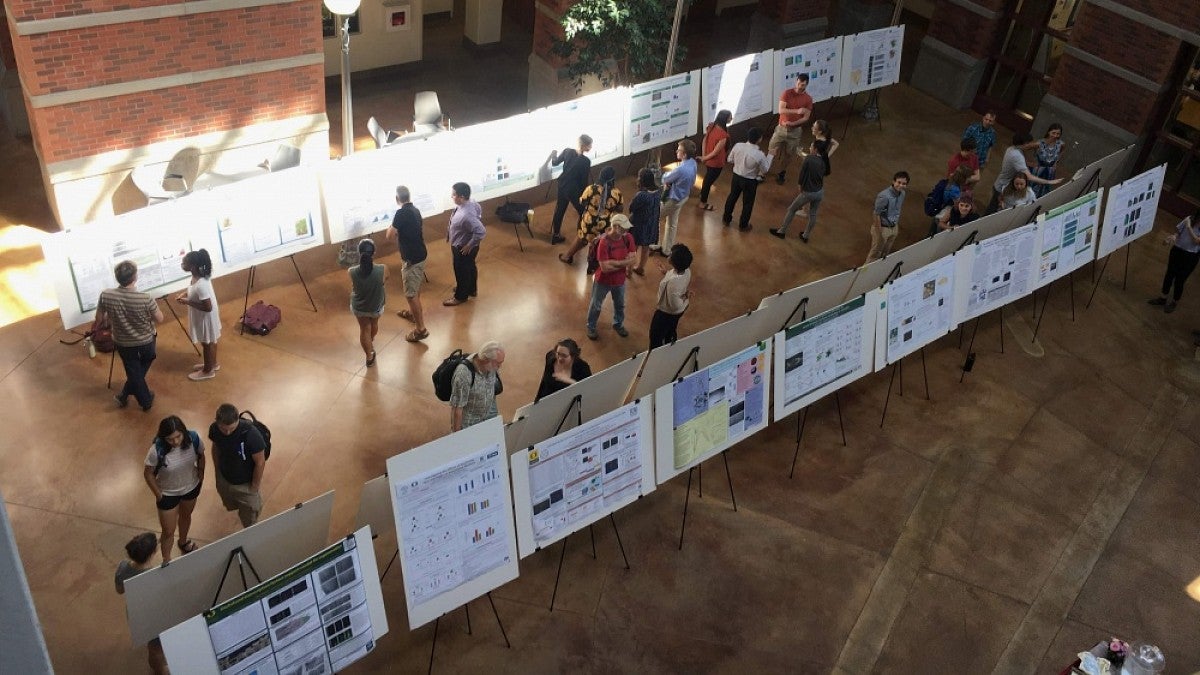Aspiring young scientists who spent the summer in campus labs will present their research findings at a symposium in Willamette Hall this week.
The students are part of the UO’s Summer Program for Undergraduate Research in Life Sciences, also known as SPUR. The symposium will run Tuesday and Wednesday, Aug. 20-21, and is free and open to the campus community.
The summer program offers fellowships to promising undergraduates from the UO and other universities to study under UO research professors in life science laboratories during the summer months. Summer interns work 10 weeks full time in the lab on a cutting-edge research investigation with support from a mentor.
“By immersing students in the exciting and sometimes frustrating process of discovery and then expecting our students to communicate their findings, students learn what it takes to pursue a research career,” said program director Bryan Rebar. “The SPUR symposium is the culmination of a rigorous and rich immersion program for our students, who come from all walks of life and across the country.”
The summer program is part of a national effort to raise competence in science, technology, engineering and math, also known as the STEM fields. It boosts opportunities for research careers for students with limited access to lab facilities and experience, broadens the participation of minority researchers in STEM fields, and trains graduate students and postdoctoral fellows to be effective mentors.
This year, faculty members and mentors are working with 28 undergraduate students from the UO and 15 other institutions. Research projects range from studies of genetic disorders using zebrafish to the influence of heat on athletes engaged in intense exercise.
Because the program takes place in the summer months, outside of regular classes, the program allows students to fully engage in research projects without the distractions of the school year.
“It’s a great program for undergraduates who are really trying to immerse themselves in research without having any academic commitments,” said Bryson Tyler Ricamona, a senior biology major at the UO specializing in cellular, molecular and developmental biology and a program intern in the lab of developmental biologist Kryn Stankunas. “I gained more advanced skills and techniques to apply in a research setting, as well as the ability to communicate my findings to the scientific community.”
Rebar said the program is about more than research, calling it a community-building experience as well. Students are encouraged to make connections with the people they meet, develop their communication skills and grow their networks.
Participants attend three weekly sessions to support their professional growth. Faculty members, post-doctoral students and graduate students discuss their research and their pathways to careers in professional development workshops, often facilitated by UO faculty members.
Students also focus on everything from applying to graduate school to responsible conduct of research to how to present a scientific poster and talk.
Students learn about other types of scientific research taking place at the UO through organized overnight weekend camping trips to the UO’s Oregon Institute of Marine Biology on the coast and Pine Mountain Observatory east of Bend, a trip that also includes a visit to Newberry National Volcanic Monument with a geology faculty member as the guide and interpreter.
“We’re all undergraduate research students, and having a group of friends who are also really involved in science who can listen to you and understand what you’re working on is really cool,” said Karina Herrera, a visiting senior biochemistry major from California State University San Bernardino who interned in the lab of UO biologist John Postlethwait. “SPUR organized a lot of fun activities to get us out there and really explore. Oregon is amazing.”
Herrera has not decided where she will apply for graduate school, but the native Californian was impressed by the green forests of Oregon and said the UO is on her short list. Rebar said the vast majority of program participants go on to pursue advanced degrees and more than half are expected to earn or have already earned doctorates.
“SPUR interns are among the best and brightest aspiring scientists, and they represent a wide diversity of backgrounds,” Rebar said. “We hope some will choose the University of Oregon to continue their graduate studies, and we hope all will feel forever connected to our Oregon community.”
SPUR symposium presentations will take place in Room 110, Willamette Hall and the Willamette Hall atrium Tuesday and Wednesday. UO President Michael H. Schill will deliver opening remarks at 8:45 a.m. Tuesday in Room 110.
Oral presentations run from 9 a.m. to 2 p.m. Tuesday and from 9 a.m. to 1:30 p.m. Wednesday, also in Willamette Hall’s Room 110. Poster sessions run from 2 to 4 p.m. Tuesday and Wednesday in the Willamette Hall atrium.
Provost Patrick Phillips will deliver opening remarks at 2 p.m. Wednesday in Room 110 prior to the poster session.


